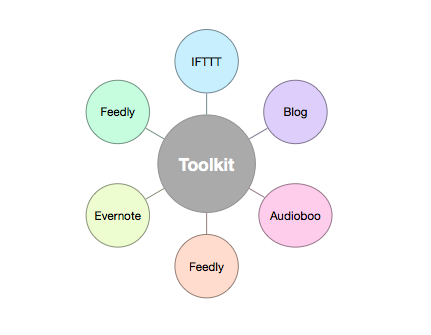This might be common knowledge for some of you, but I just stumbled across it so I wanted to share. I have written a few times before on how I am having students blog (via any blogging tool of their choice) and use Audioboo to increase participation outside the class (considering my university doesn’t have a centralized LMS that supports anything more than posted information). I then stream the collected RSS into Feedly, and then use IFTTT to make spreadsheets of who I am giving feedback to and when (to make sure I am giving everyone feedback). These tools have made the courses manageable this semester; otherwise, I suspect I would be drowning in grading. If they disappear in the near future as I suspect at least some of them will, I will find others. I am resourceful.
However, I needed a tool that would allow me to easily give feedback on and grade submissions provided through Audioboo and blogs without posting that feedback to the sites themselves (and making this feedback public, which however in love I am with open learning, that is a step too far). I wanted to avoid copying entire submissions from blogs into documents, marking them up, and emailing them to students. I found something that approximates that process without becoming as onerous. Evernote allows me to do all of that and truth be told, it is a bit of an ideal tool for a teacher. Let me demonstrate my process.
- Submission is posted to Audioboo or their blog
- RSS streams into Feedly (into folders for each class)
- I sync my Evernote with Feedly and save post to folder for the class in Evernote
- From Evernote I can mark it up any number of ways
- I email the marked up note to the student as feedback
The mark up options on Evernote are quite good. I can mark it up as text, annotate an image (important as I have my students do a lot with cohesion in their use of imagery or multimedia), or even record an audio note within the body of the text. It provides capacity for quite a range of activity and I find it actually encouraging to provide more and more feedback (by providing me with different channels (audio, text, etc.) to do so). So I believe this will be my toolkit going into next semester.
Another advantage is that all of these tools have their accompanying mobile application which allows me to provide feedback from my mobile device and have it all managed automatically. Most of my students do their submissions strictly through their mobile apps (they are excellent texters; why wouldn’t I take advantage of that?). I see this all as a good automated workflow for those without a centralized LMS to manage all this disparate activity.






Older post but revisiting these ideas: Managing course feedback w/Evernote (& Feedly) wo/centralized blogging tool… https://t.co/MKfQEloN0C